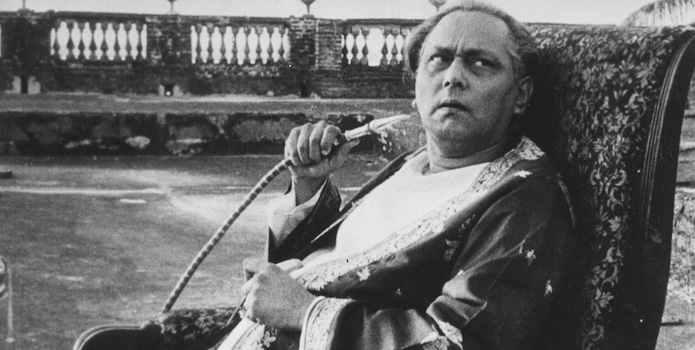The Music Room (1958)
Cast: Chhabi Biswas, Sardar Akhtar, Gangapada Basu
Director: Satyajit Ray
Country: India
Genre: Drama | Music
Official Site: Here
Editor’s Notes: The following review is part of our coverage for TIFF’s The Sun and the Moon: The Films of Satyajit Ray. For more information on upcoming TIFF film series visit http://tiff.net and follow TIFF on Twitter at @TIFF_NET.
For Satyajit Ray’s third feature, he took a break from his Apu Trilogy to make a film about a broken man, once important but now barely remembered and then only as a formality. This man, Huzur Biswambhar Roy (Chhabi Biswas), was the landowner of an entire area who lived in an elaborate palace with his wife Mahamaya (Padmadevi) and child Khoka (Pinaki Sengupta) and instead of managing the land, he spends his entire fortune on concerts in his splendiferous titular music room.
The film would be great for the musical sequences alone, but with the emotional story to accompany it the film is remarkable.
Roy is also a very petty man. He has a one-sided rivalry with a moneylender’s son Mahim Ganguli (Gangapada Basu) who has moved back to the area after twenty years building a fortune away. Roy refuses to ask for a much needed loan from Ganguli because someone in his position can’t take a loan from a low-born money lender. Roy is content to take loans out on the jewels and the palace (which he’s already been turned down for more credit) to fund his musical obsession instead of actually managing the land, which is dwindling due to rising waters. When Mahamaya and Khoka go to care for her ailing parents, Roy stays home for no real apparent reason. Ganguli comes to call, saying he wishes Roy to come to his new house’s even newer music room for the first concert on the new year. Roy states he’d love to come, but he’s having a recital that very evening (though no plans have been made to that end, surprising and saddening his valet). Roy orders word sent to his wife and son to come home for the concert, which is his greatest mistake. Tragedy strikes, leaving him alone and broken.
Ray sets his story through flashback, mostly. The image Ray uses to open the film, after the opening credits that focus on the resplendent chandelier from the music room, is a close-up of Roy just staring out into space on the roof of his palace. This opening followed by a long shot of the richly upholstered chair with a hooka beside it and the vastness of space beyond him gives us exactly what we need to know about him right off. He’s distracted, lost in the misery of his past and alone in a void. The events that bookend the film are set four years after the tragedy told in the middle of the film. These four years are not kind to Roy, who appears much older and walking with a cane. Ray has Biswas really play up the age of Roy to give us a sense that he’s been living like this for much longer than he has. It serves to tell us that it’s been much more than four years to Roy. Ray uses a fluidly moving camera to get the scope of things while Roy is sitting down, then locks down the camera for a static long shot while Roy walks around a little.
Ray’s use of the camera is inventive throughout the film. He uses reaction shots to give us clearer insights into the characters than his dialogue can and keeps the motif of a still camera when the actors a moving and a moving camera when they are still almost to show that time stands still when they move but rushes on when they stand still. His focus is always on Roy, I don’t think there is a scene or shot without him in it, yet the film is not in a first-person perspective. We are distanced from him by Ray so we can spend a lot of time with him, even root for him occasionally, but ultimately we see him for what he is, which is selfish and somewhat hedonistic. Then, when the film reverts back to its starting point and we see Roy deciding to make a change, going into the music room and ordering it cleaned up, going downstairs for the first time in four years to see his horses, kept on because they were his son’s favorites, and ordering a concert we start to feel like he’s finally coming out of himself after this great tragedy. Sure, he’s going back to being the same fairly unlikeable character he was before the incident, but he seems to have a new vigor about life. His servants and the audience are happy because it is a man coming out of the fog of depression, deciding to live again and embrace the thing he loved most before that depression: music.
Roy’s tale is also a cautionary one, because just when it seems he’s about to put the past behind him, it catches up with him.
Ray is careful throughout the film to keep Roy as sympathetic as possible while still letting the audience not really like him. Biswas makes sure that even while he has Roy putting on airs and acting like he’s still worth something more than debt that we feel a little sorry for him. In no small way, Biswas plays Roy as an addict who will do whatever it takes to get his next fix. His addiction to music, power and prestige does to him what addiction to anything ultimately does: ruin his life. He sees this to some extent when he says he’ll listen to no more music after his family dies, but instead of reinvesting in his life and land and making amends for his transgressions, he simply sits around and lets himself and his home go to ruin. He shuts down and that is where we can identify with him, oddly enough.
The depression that surrounds Roy is one that many people have faced at one point or another in their lives. Some struggle with it daily and for many years. He’s not sympathetic because he’s likeable, he’s sympathetic because he’s relatable. We wish we could just shut down and close out the world, only to have servants still wait on us when something terrible strikes us. But Roy’s tale is also a cautionary one, because just when it seems he’s about to put the past behind him, it catches up with him.
And I haven’t even mentioned the spectacular music that pervades the film. Ray clearly had a musical mind, considering he had Ravi Shankar do the music for his debut feature Pather Panchali and makes this film about the love one man has for music. The film would be great for the musical sequences alone, but with the emotional story to accompany it the film is remarkable.
With The Music Room, Ray captures elements of life, love and loss that are rarely seen on screen. His shift in perspective from his first two films, from poverty to wealth (thought there is a very fine line between the two in Ray’s stories), shows that he wasn’t just interested in one thing. He told elemental stories that transcend their settings. On the surface, they deal with Indian people and culture, but they go deeper and speak to global situations and universal human emotions. His films speak to the broader scope of humanity and The Music Room is no exception.
With The Music Room, Ray captures elements of life, love and loss that are rarely seen on screen.





